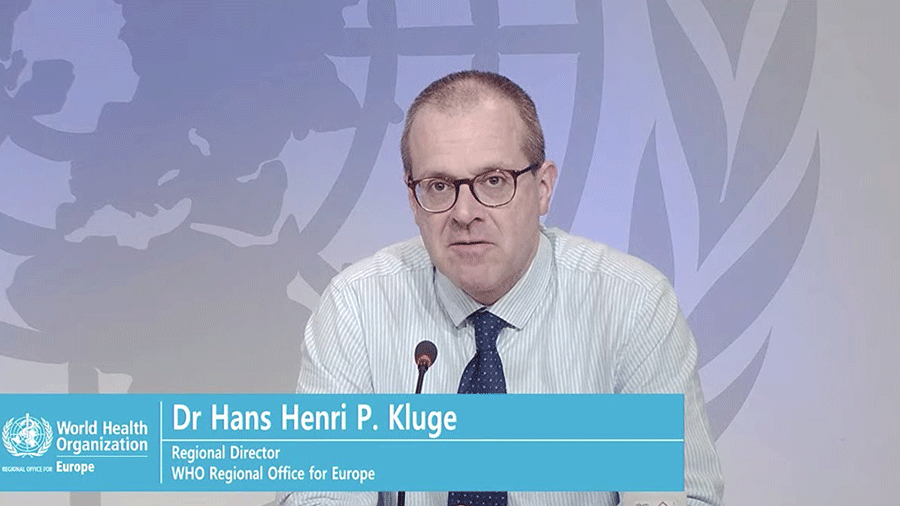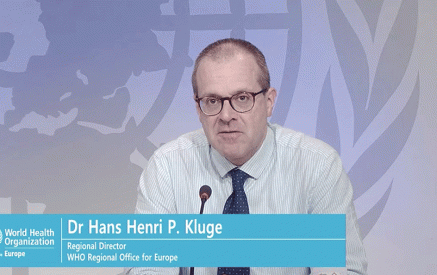Statement by WHO Regional Director for Europe, Dr Hans Henri P. Kluge
Copenhagen, 16 January 2024
Good morning, good afternoon.
I’d like to wish all of you a very Happy New Year from everyone here at WHO’s Regional Office for Europe.
Read also
We certainly hope for a healthy and more peaceful 2024.
And on that note, I’d like to begin with some positive news.
A new study led by WHO/Europe has found that at least 1.4 million lives in our Region were saved thanks to safe and effective COVID-19 vaccines.
Without them, the European Region’s cumulative known death toll could have been around 4 million, possibly even higher.
Our analysis of 34 countries also found that more than 90% of lives saved were people over the age of 60.
Overall, COVID-19 vaccines reduced death by 57% across the WHO European Region, between December 2020 when the vaccine rollouts began, and March 2023.
In fact, the first booster doses alone saved an estimated 700,000 lives.
Just think about it.
Today, there are 1.4 million people in our Region – most of them elderly – who are around to enjoy life with their loved ones because they took the vital decision to be vaccinated against COVID-19.
This is the power of vaccines. The evidence is irrefutable.
WHO’s recommendation is for persons at highest risk from COVID-19 to continue to be re-vaccinated six to twelve months after their most recent dose. This includes the elderly, pregnant women, the immunocompromised and those with significant chronic medical conditions, and frontline health workers.
Besides COVID-19, the European Region is seeing widespread circulation of respiratory viruses like influenza, Respiratory Syncytial Virus (RSV) and measles.
When looking overall at the region, we can see that RSV rates peaked before the new year and are now declining, COVID-19 rates remain elevated but are decreasing, and influenza rates are now rapidly increasing.
And while this isn’t necessarily out of the ordinary, we would like to draw your attention to a few trends.
As we speak, we are seeing a high intensity of influenza infections in several countries across the region. Health systems should be ready to see a likely surge in influenza cases over the coming weeks.
Across the region, the past two weeks have seen a 58% increase in reported hospitalizations for influenza, and a 21% increase in ICU admissions, compared to the previous two weeks.
Influenza cases increased four-fold between November and December, with 38 countries in our region reporting the start of the seasonal influenza epidemic.
As expected, the groups most affected by severe disease are the over 65’s and the very young.
We are concerned about reports of localised pressures on hospitals and overcrowding in emergency rooms, due to a confluence of circulating respiratory viruses.
In addition to COVID-19 and influenza circulation, RSV and other pathogens such as Mycoplasma and Measles have caused increased hospitalizations among children.
Also, while COVID-19 infection rates are broadly decreasing across our region, this can rapidly change.
A new SARS-CoV-2 variant of interest – known as JN.1 – is fast replacing other known variants.
It’s now the most common variant being reported globally and is the dominant variant circulating in our region, accounting for 79% of sequenced variants.
Though there’s no current evidence to suggest the JN.1 variant is more severe, the unpredictable nature of this virus shows how vital it is that countries continue to monitor for any new variants.
Many countries have reduced or stopped reporting on COVID-19 to WHO. I cannot stress enough how important continued COVID-19 surveillance is, alongside other circulating respiratory viruses.
13 countries in our region did not report any data on respiratory viruses last week. Surveillance remains our first line of defense to monitor unpredictable respiratory pathogens, be it mutations or new viruses
COVID-19 is here to stay.
The pandemic years taught us a great deal, not least that protecting yourself and others from respiratory infections is a newly accepted way of living.
We know how to keep ourselves and others safe, whether from COVID-19 or other respiratory infections.
No one knows your risk like you yourself do.
What we need to do now is apply that knowledge when and where it matters.
This means assessing our own level of risk and our risk to others at every step of our days. And then apply the protective measures that matter most to reduce the chances of catching or spreading respiratory infections.
Measures range from staying at home if sick, hand and cough hygiene, and adequate indoor ventilation; to mask-wearing in certain settings – such as hospitals or crowded places. In this context, we all need to use our own judgement when taking steps to protect ourselves, and others around us, based on an individual assessment of risk.
Importantly, as we learn to live with COVID-19 and other respiratory viruses, it’s absolutely vital for vulnerable populations to stay up to date with their COVID-19 and influenza vaccinations as recommended.
As we put a difficult 2023 behind us and look forward to 2024, I am deeply concerned that health is slipping from the political agenda and that we are failing to address the ticking time-bomb facing our health and care workforce.
As health systems come under strain, we are reminded that we may be unprepared for anything out-of-the-ordinary, such as the emergence of a new, more severe COVID-19 variant or a yet unknown pathogen.
In closing, I encourage everyone to show gratitude, patience, and solidarity with the dedicated health workers who are doing their utmost best under difficult circumstances.
I ask policymakers and healthcare leaders to show demonstrable support for the health workforce.
Not with words but with action.
Thank you.





























































